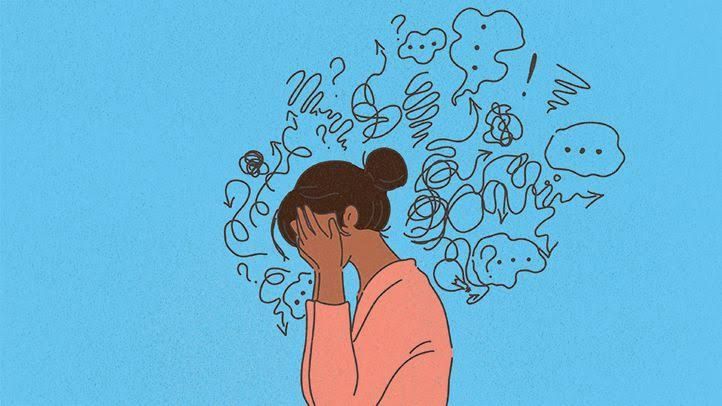Depression is a mood or emotional state characterized by feelings of low self-worth or guilt and a diminished ability to enjoy life, according to psychology.
Feelings of sadness, hopelessness, or pessimism; lowered self-esteem and heightened self-depreciation; a decrease or loss of ability to enjoy ordinary activities; decreased energy and vitality; slowness of thought or action; loss of appetite; and disturbed sleep or insomnia are all symptoms of depression.
Depression is distinct from simple grief or mourning, which are appropriate emotional responses to the death of a loved one or an object.
When there are clear reasons for a person's unhappiness, depression is considered present if the depressed mood lasts a disproportionately long time or is more severe than the precipitating event.
Depression is the most common psychiatric complaint, and it has been described by doctors since before the time of ancient Greek physician Hippocrates, who referred to it as melancholia.
The disorder's progression varies widely from person to person; it can be mild or severe, acute or chronic.
Depression can last for four months at least if left untreated. Women often suffer depression more than men
The typical onset age is in the twenties, but it can happen at any age.
Various factors can cause depression..
Unfavorable life events can make a person more susceptible to depression or trigger deep depression.
Bad thoughts regarding one's own and the world play an important role in the development and maintenance of depressive symptoms.
However, both psycho-social and metabolic processes appear to be worthwhile issues; the primary biochemical cause appears to be faulty regulatory oversight of the release of one or more natural sources of neurotransmission, specifically norepinephrine and serotonin.
Depressed mood is thought to be caused by decreased amounts of decreased activity of these brain chemicals in some sufferers.
Depression is also linked to irregular rapid eye movement (REM) snooze. The amygdala is a brain region that includes neurons that construct into the brainstem and appear to be involved in modifying REM sleep.
The amygdala is also associated with negative thought processing and, in some depressed people, may be expanded, excitable, and otherwise unsatisfactory.
Even though the importance of these connections has yet to be determined, disordered REM sleep and amygdala abnormalities have opened up new avenues of investigation into the neurophysiology and treatment of mental health problems.
According to research, depression is also related to physical activity, and physical activity may reduce a person's risk of depression.
Individuals who exercise have better health and are less likely to be depressed than those who do not exercise.
Types of depression...
The three main types of depression are; bipolar disorder, major depression, and depression.
Bipolar disorder is defined as varieties of depression and mania (unusual elevation of mood) or episodes of mania (distinct, but not inevitably abnormal, the elevation of mood).
Major depressive disorder is characterized by severe symptoms that interfere with daily life, typically affecting the desire to eat, sleep, work, or the sense of happiness.
Major depressive episodes can appear at any age and it may occur just once or numerous times in a person's life.
Persistent depressive disorder is characterized by illnesses that last two or more years and are sometimes accompanied by episodes of depression.
Women suffers a type of depression called postpartum depression after childbirth. Nervousness, a loss of enthusiasm in caring again for an infant, and sadness, loss of hope, or inadequacy are all symptoms.
Postpartum depression is more severe and lasts longer than "baby blues," a common symptom among many women after childbirth that includes mood swings, sadness, and crying spells.
Psychotic depression develops in the context of psychosis, which may include signs of delusions, hallucinations, or paranoia.
Action disorder is distinguished by the initiation of depressive symptoms in the fall and winter, which are alleviated by enhanced exposure to environmental light in the spring and summer.
TREATMENT OF DEPRESSION
Depression can be treated in three ways which include; Psychotherapy and psychotropic medication. Specifically, antidepressants are by far the most important and widely used.
Psychotherapy aims to change the patient's maladaptive cognitive and behavioral reactions to stressors life events while also providing emotional support.
Antidepressant medications, on the other hand, directly affect brain chemistry and are thought to achieve therapeutic benefits by correcting the synthetic derangements that cause depression.
Though chemically distinct, two types of medications, tricyclic antidepressants and serotonin-norepinephrine reuptake inhibitors (SSRIs; e.g., fluoxetine [Prozac]), both serve to prevent presynaptic serotonin-norepinephrine reuptake (and in the case of tricyclic antidepressants, norepinephrine as well).
Some people who suffer from depression have treatment-resistant depression (TRD), which means they are resistant to existing treatments.
Alternative therapeutic approaches, such as deep brain stimulation (DBS) and gene therapy, have been investigated for these individuals. DBS exploratory study has concentrated on the insertion of an anode in a region of the brain known as the nucleus accumbens, which is located deep within the cerebral hemispheres in the striatum (neostriatum) and is affiliated with emotions and feelings such as fear, pleasure, and reward.
Decreased levels of a specific protein as p11 in cells of the amygdala have been linked to depression in research of depressed living creatures and postmortem brain cells of patients with depression.
Gene therapy has been shown to alleviate depression-like symptoms in depressed animals by continuing to increase p11 levels inside the nucleus accumbens. However, both DBS and gene therapy are affiliated with possibly dangerous side effects.
